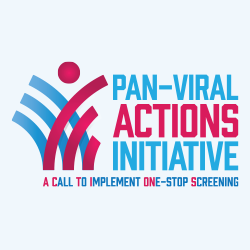Friday, March 13, 2020
6:00 PM – 6:30 PM (Registration) 6:30 PM – 8:30 PM (Educational Activity)
Philadelphia, PA
Grand Ballroom Salon H
(Level 5)
Philadelphia Marriott Downtown
Philadelphia, Pennsylvania
Joseph K. Han, MD, FARS, FAAOA
Professor, Department of Otolaryngology & Head and Neck Surgery
Chief, Division of Rhinology & Endoscopic Sinus and Skull Base Surgery
Chief, Division of Allergy
Eastern Virginia Medical School
ARS, President Elect
AAAAI, RROAC, Chair Elect
Norfolk, Virginia
John J. Oppenheimer, MD
Clinical Professor of Medicine
Rutgers New Jersey Medical School
Newark, New Jersey
Clinician, Atlantic Health System
Morristown Medical Center
Morristown, New Jersey
Reynold A. Panettieri, Jr, MD
Professor of Medicine
Robert Wood Johnson Medical School
Vice Chancellor, Translational Medicine and Science
Director, Rutgers Institute for Translational Medicine and Science
New Brunswick, New Jersey
Emeritus Professor of Medicine
University of Pennsylvania
Philadelphia, Pennsylvania
**THIS MEETING HAS BEEN CANCELED. CLICK HERE FOR MORE INFORMATION**

This activity is provided by Integritas Communications.
This activity is supported by an educational grant from Sanofi Genzyme and Regeneron Pharmaceuticals.
This program is not sponsored or programmed by the AAAAI.
This live activity will not offer continuing medical education (CME) credit.
Dinner provided.
Target Audience
The educational design of this activity addresses the needs of allergists, clinical immunologists, and other specialist clinicians involved in the management of patients with chronic rhinosinusitis with nasal polyps (CRSwNP) or asthma.
Statement of Need
Disorders involving inflammation or tissue remodeling in the respiratory tract are responsible for significant patient morbidity, potential mortality, and tremendous burdens on health care systems.1,2 In the upper airways, chronic rhinosinusitis (CRS) is characterized by inflammation in the nasal cavity mucosa and paranasal sinuses.3 A quarter to one third of patients with CRS have associated nasal polyps (CRSwNP), which can obstruct the sinuses and nasal passages and are often associated with more severe sinonasal symptoms.4 In the lower airways, asthma is a chronic respiratory disease that affects more than 25 million Americans.5 Notably, asthma affects a large proportion of patients with CRSwNP, and the presence of nasal polyps has been associated with asthma disease severity.6 An outsized segment of asthma-related morbidity and mortality is borne by the 5% to 15% of patients who have more severe forms of the disease.7 Research has uncovered pathophysiologic and phenotypic associations between diseases of the upper and lower airways, such as CRS and asthma, leading to the development of novel therapies for these disorders.8 A number of biologic medications are now available to treat certain cohorts of patients with moderate-to-severe asthma, and recently the first biologic therapy for treatment of CRSwNP has been approved by the US Food and Drug Administration (FDA).9,10 Clinical immunologists, allergists, and other specialists who manage patients with CRSwNP and asthma will be increasingly tasked with personalizing the choice of treatment based on the severity of symptoms, presence of comorbidities, and disease phenotypes and endotypes. Thus, clinicians must be vigilant about staying current on the latest clinical data, treatment recommendations, and new approvals from the FDA. During this Case-in-Point™ educational program, a panel of expert faculty will guide learners through unique clinical case scenarios, sharing relevant guideline recommendations, published data, and clinical insights before a brief question-and-answer session concludes each case discussion. Program attendees will find this interactive session informative and engaging, as it combines evidence-based management strategies and real-world experience into actionable best-practice recommendations that can shape therapeutic decision-making.
References
- Lang DM. Allergy Asthma Proc. 2015;36(6):418-424.
- Bhattacharyya N, et al. Laryngoscope. 2019;129(9):1969-1975.
- Orlandi RR, et al. Int Forum Allergy Rhinol. 2016;6(suppl 1):S22-S209.
- Stevens WW, et al. J Allergy Clin Immunol Pract. 2016;4(4):565-572.
- Centers for Disease Control and Prevention (CDC). Asthma Facts: CDC’s National Asthma Control Program Grantees. Atlanta, GA: US Department of Health and Human Services. 2013.
- Fokkens WJ, et al. Allergy. 2019;74(12):2312-2319.
- Chung KF, et al. Eur Respir J. 2014;43(2):343-373.
- Rosati MG, Peters AT. Am J Rhinol Allergy. 2016;30(1):44-47.
- Assaf SM, Hanania NA. Curr Opin Allergy Clin Immunol. 2019;19(4):379-386.
- Laidlaw TM, Buchheit KM. Ann Allergy Asthma Immunol. 2019. [Epub ahead of print].
Educational Objectives
Upon completion of this activity, participants will be better able to:
- Compare clinically relevant inflammatory processes involved in the pathophysiology of CRSwNP and asthma
- Longitudinally evaluate patients with asthma or CRSwNP for severity of disease, control of symptoms, and treatment responses
- Discuss the biologic treatment armamentarium for CRSwNP and moderate-to-severe asthma
- Construct individualized treatment regimens for patients with CRSwNP or moderate-to-severe asthma based on symptoms, comorbidities, and shared clinical decision-making
Program Agenda
6:30 pm - 6:40 pm Introductions and Preactivity Questionnaire
6:40 pm - 7:10 pm Case 1: Managing a Case of Moderate-to-Severe Asthma
7:10 pm - 7:15 pm Audience Question and Answer
7:15 pm - 7:45 pm Case 2: Managing a Case of CRSwNP
7:45 pm - 7:50 pm Audience Question and Answer
7:50 pm - 8:10 pm Case 3: Managing Comorbid CRSwNP and Moderate-to-Severe Asthma
8:10 pm - 8:15 pm Audience Question and Answer
8:15 pm - 8:30 pm Concluding Comments and Postactivity Questionnaire
Provider Statement
This activity has been planned and implemented in accordance with the accreditation requirements and policies of the Accreditation Council for Continuing Medical Education (ACCME) through providership of Integritas Communications.
Disclosure of Conflicts of Interest
Integritas requires instructors, planners, managers, and other individuals and their spouses/life partners who are in a position to control the content of this activity to disclose any real or apparent conflicts of interest they may have as related to the content of this activity. All identified conflicts of interest are thoroughly vetted by Integritas for fair balance, scientific objectivity of studies mentioned in the materials or used as the basis for content, and appropriateness of patient care recommendations.
Fee Information & Refund/Cancellation Policy
There is no registration fee for attending this program, however, seating is limited. Preregistration does not guarantee seating. We recommend arriving at the symposium location early.
Americans With Disability Act
Event staff will be glad to assist you with any special needs (ie, physical, dietary, etc). Please contact us prior to the live event at info@exchangecme.com.
Integritas Contact Information
For information about this program, please contact Integirtas at info@exchangecme.com.
Register Now


15
2026
Pan-Viral ACTIONS Initiative
A Call to Implement One-Stop Screening
| Time: | 12:00 PM-1:00 PM PT |
| Venue: | In-Person Training - TURN to Recovery Staff |
| Location: | Santee, CA |
| Faculty: | Stacey B. Trooskin, MD, PhD, MPH |


29
2026
Pan-Viral ACTIONS Initiative
A Call to Implement One-Stop Screening
| Time: | 12:30 PM-1:30 PM CT |
| Venue: | In-Person Training - Kolbe Clinic Staff |
| Location: | Chelsea, AL |
| Faculty: | Stacey B. Trooskin, MD, PhD, MPH |






